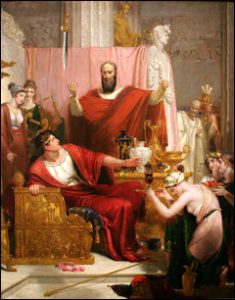
A proposed cap on tuition & fees is a flawed solution for runaway college costs. But it has the virtue, like the sword of Damocles, of focusing the minds of college presidents on what should be their top concern.
In the previous post I published a position paper distributed by the Partners for College Affordability and Public Trust, a sponsor of this blog, making the case that the General Assembly should freeze tuition & fees at public Virginia universities.
I share the overall goals of Partners — long-time Bacon’s Rebellion readers know that I have crusaded against escalating college tuition for years. College affordability is one of the defining issues of this blog. Also, I fully support the Partners’ proposals for increased transparency and governance reform for Virginia’s higher-ed system. (See “The Reform Agenda of Virginia’s Higher-Ed Critics.“)
Escalating tuition & fees is creating a social crisis as ever-growing numbers of college graduates enter the working world encumbered with ever-growing piles of debt — not counting the college dropouts who fail to earn a degree and enter the workplace lacking the credential needed to find a job that will enable them to pay off their debt. The higher-ed system in this country is creating a generation of debt slaves (who cannot legally discharge their debt) in order to sustain out-of-control spending on administrative sinecures and star faculty who burnish institutional prestige but do little teaching.
So, yes, we have reached a crisis, and something drastic needs to be done. I’m just ambivalent about getting the General Assembly to cap tuition & fees. I see it as a necessary evil.
A strength of Virginia’s system of higher education is its institutional diversity arising from a decentralized system of governance. Virginia’s colleges and universities have been allowed to define their own identities and carve out their own niches in the highly competitive higher-ed marketplace. This has been particularly beneficial for the non-elite institutions. Thus, Mary Washington University has evolved as a college appealing to socially conscious kids with Peace Corps-like aspirations, Longwood University has positioned itself as a champion of the liberal arts (liberal in the traditional sense of the word), Norfolk State University is restructuring itself around faculty-student-alumni collaborations called PODS, and Christopher Newport University has evolved into that rarest of creatures, a college that is friendly to conservatives. These smaller institutions give Virginia’s higher-ed system bench strength that few other state systems possess.
Micro-managing tuition & fees is the antithesis of the decentralized management that has fostered this flowering of second-tier institutions.
Some public institutions have pushed tuition & fee increases more aggressively than others. As the Partners white paper notes, increases have varied widely from college to college, ranging from from 149.8% over the past 15 years at Old Dominion University to 344% at College of William & Mary. Imposing a uniform cap would penalize universities that have withstood the pressure to charge more in the past, depriving them of the ability to make necessary adjustments in the future. Outrage at William & Mary’s excesses do not justify punishing colleges like Virginia Tech, ODU, NSU, Longwood, Virginia State University, and the University of Virginia-Wise Campus, which have pursued more restrained tuition policies over the years.
We need more transparency — more openness into data and into the decision-making process inside colleges and universities — and better governance. Board appointees at public colleges and universities should be instructed that their primary responsibility is to the public and the students they serve, not to ambitious college presidents with dreams of institutional glory. The Partners’ recommendations on this score are excellent.
While I have yet to be persuaded that a freeze on tuition & fees would be a good thing if actually implemented, I do believe it is a useful “sword of Damocles” to hang over the heads of university presidents. Something needs to instill the fear of God in the top echelons of university administrations. University presidents are keenly attuned to the priorities of their internal constituencies. They need also to clearly understand the frustration and outrage of the parents and taxpayers who pay the bills. A credible threat of a tuition freeze should concentrate their minds wonderfully.


